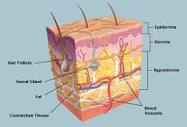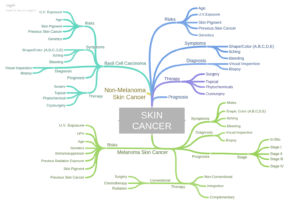
Diagnosed with Cancer? Your two greatest challenges are understanding cancer and understanding possible side effects from chemo and radiation. Knowledge is Power!
Learn about conventional, complementary, and integrative therapies.
Dealing with treatment side effects? Learn about evidence-based therapies to alleviate your symptoms.
Click the orange button to the right to learn more.
- You are here:
- Home »
- Blog »
- Skin Cancer »
- Skin Cancer Diagnosis- Melanoma vs. Non-Melanoma Skin Cancer
Skin Cancer Diagnosis- Melanoma vs. Non-Melanoma Skin Cancer

“Accurate clinical and histopathological analysis of pigmented skin lesions is difficult even for experts”…Really?
Skin Cancer can be difficult to diagnose. As the illustration below indicates skin cancer, its causes, therapies, risks, etc. is complicated. So people with moles, freckles, spots, etc. rely on their dermatologists to properly diagnose skin cancer from non-skin cancer, melanoma from non-melanoma.
Guess what? Dermatologist rely on pathologists who often disagree on what is an isn’t cancer.
Pathologists disagree on many different types and stages of cancer. It is no surprise then, to read an article about a gene test that improves the diagnosing of different types of skin cancers.
The solution? First and foremost, go to a dermatologist who is experienced with a dermoscope. Step #2 is to have your dermatologist use the gene test discussed below.
I am a cancer survivor and cancer coach. I have watched early stage breast and prostate cancer survivor benefit from similar gene tests. Patients need all the information they can get. Gene tests that indicate the type and stage of skin cancer is another important piece of the puzzle.
The third and final step is to add evidence-based, non-toxic nutrition, supplementation and lifestyle therapies into your day in order to reduce your risks of melanoma.
Have you been diagnosed with skin cancer- melanoma or non-melanoma? Scroll down the page, post a question or comment and I will reply to you ASAP.
Thank you,
David Emerson
- Cancer Survivor
- Cancer Coach
- Director PeopleBeatingCancer
Recommended Reading:
- Non-Melanoma Skin Cancer Risk Increases From Radiation
- Preventing Non-Melanoma Skin Cancer Relapse
- How to Identify Skin Cancer in 5 Steps
- Skin Cancer, Vitamin D3 and Sunlight
Noninvasive 2-Gene Test Helps Distinguish Melanoma From Nonmelanoma
“A new 2-gene pigmented lesion test that classifies skin lesions as melanoma or nonmelanoma could help with diagnostic challenges physicians frequently face with the visual image and pattern recognition approach…
Accurate clinical and histopathological analysis of pigmented skin lesions is difficult even for experts. Accurate, noninvasive diagnostic techniques could help in skin cancer diagnoses…
This 2-gene approach with LINC00518 and/or PRAME detection distinguished melanoma from nonmelanoma with 91% sensitivity and 69% specificity…”
SHOULD I GET GENETIC TESTING FOR MELANOMA?
“Genetic testing may be recommended when you have one of these risks
In the United States, a dermatologist may consider genetic counseling and possibly genetic testing for melanoma if you have had one (or more) of the following:
- 3 or more melanomas that have grown deep into your skin (or spread), especially if one melanoma was diagnosed before your 45th birthday
- 3 or more blood relatives on one side of your family who have had melanoma or cancer of the pancreas
- 2 or more unusual-looking moles called Spitz nevi
- 1 or more Spitz nevi and a close blood relative has (or had) mesothelioma (a type of cancer), meningioma (a type of brain tumor), or melanoma of the eye1
Positive genetic test for melanoma can provide important information
A genetic test for melanoma can tell you about more than your melanoma risk. People who carry a mutation on a gene known as CDKN2A have a higher risk of developing melanoma, cancer of the pancreas, or a tumor in the central nervous system.
A mutation on the gene called BAP1 means a higher risk of getting melanoma, melanoma of the eye, or cancers like mesothelioma and kidney cancer.
A genetic test cannot tell you whether will develop one of these cancers.
But knowing these risks can be helpful. It can help people get needed cancer screenings.
A positive test for melanoma can also help your dermatologist monitor you for signs of skin cancer. Patients with a high risk may need more frequent skin cancer screenings. Total body photography can show changes to your moles, which can help find a melanoma in its earliest stage.
A positive test also has some drawbacks. It causes some people to feel anxious and worried. Some people worry that an insurance company may discriminate against them.
Negative test can give you a false sense of security
If the test shows that you don’t have a gene mutation for melanoma, that’s great news. But it doesn’t mean that you cannot get melanoma. More people are diagnosed with melanoma than ever before. Most of them, 90%, don’t have a gene mutation that increases their risk.
Dermatologists caution that everyone needs to protect their skin from the sun. You still need to check your skin for signs of skin cancer. And you should keep all follow-up appointments with your dermatologist.


